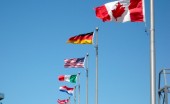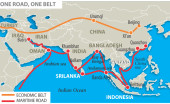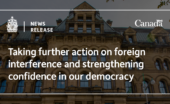Re Ian Bremmer 'Could third-party candidates upend the 2024 US election?' 3 April The current political movement in the USA…
Canada – China August 2023
Written by Diana Thebaud Nicholson // April 16, 2024 // Canada, China // No comments
Politico Ottawa Playbook -always an entertaining read – mentions in passing Sharp tongues and wishful thinking that “[Minister Melanie] Joly has yet to visit China since her appointment as foreign minister in late 2021. She arrives in Capri, Italy today for the first of two G7 foreign ministers meetings this year. Joly is the only G7 foreign minister to have not visited China in the past year.”
…Deputy minister, DAVID MORRISON, will visit China by the end of the month, according to a senior government official not authorized to talk publicly about details on the upcoming trip.
— Signs of rapprochement: Morrison’s trip will follow one made last month by a delegation that included Liberal MP MAJID JOWHARI, NDP MP DON DAVIES, Conservative Sen. VICTOR OH, Independent Senators Group Sen. PAUL MASSICOTTE and independent MP HAN DONG.
11 April
A club for hemming China in
Stephen Maher
(GZERO Media) On Monday — the day that Prime Minister Justin Trudeau told reporters that Canada is interested in joining the AUKUS defense alliance — documents were released at a public inquiry that showed that Canada’s intelligence agency believes China “clandestinely and deceptively interfered in both the 2019 and 2021 general elections.”
Historically, Canada spends little on defense, falling well short of the 2% of GDP that NATO members have all agreed to spend. In an increasingly dangerous world, though, pressure is mounting for Canada to step up, and on Monday, Trudueau’s government did roll out a five-year plan to bring defense spending up to 1.76% of GDP by 2030, up from 1.38% last year.
Allies welcomed the announcement, but there was nothing significant enough to make Canada a much more desirable partner for AUKUS, says Eugene Lang, a former Liberal defense official turned Queens University professor.
“I just don’t know that we’re doing anything to get their attention,” he says. “What they’re doing in AUKUS is investing in developing brand-new technologies. To my knowledge, Canada has not got any specific money set aside for any of that.”
University of Ottawa Professor Thomas Juneau, who has interviewed allied officials about Canada’s potential role in AUKUS, found that Canada is increasingly seen as a free rider in defense and intelligence circles. It’s not surprising that Japan was invited before Canada, he says.
“It’s really normal for AUKUS to bring in Japan before Canada because Japan is not only a much bigger country than we are, but it’s right next to China.”
28 February
Censored documents about Winnipeg scientists reveal threat to Canada’s security
(Globe & Mail) Two scientists at Canada’s high-security infectious disease laboratory – Xiangguo Qiu and her husband, Keding Cheng – provided confidential scientific information to China and were fired after a probe concluded she posed “a realistic and credible threat to Canada’s economic security” and it was discovered they engaged in clandestine meetings with Chinese officials, documents tabled in the House of Commons reveal.
The two infectious-disease scientists were escorted out of the National Microbiology Laboratory in Winnipeg in July, 2019, and later had their security clearances revoked. They were fired in January, 2021. Their whereabouts are not known.
CSIS, in a Jan. 8, 2021, report marked secret, said its findings call “into question Ms. Qiu’s loyalty to Canada and her reliability as it relates to loyalty.”
It highlights her “close and clandestine relationships with a variety of entities of the People’s Republic of China, which is a known security threat to Canada,” her “complete lack of candour regarding her relationship with those institutions and her reckless judgment regarding decisions that could have impacted public safety and the interests of Canada.”
18 February
Chinese FM urges Canada to create positive elements for bilateral relations
As China and Canada differ in system, history and culture, the two sides should respect and learn from each other to expand consensus, rebuild trust to achieve win-win cooperation, noted Wang.
(Xinhua) — It is hoped that Canada could establish a correct understanding of China, take a long-term view of bilateral relations and provide a positive perspective for their practical cooperation, said Chinese Foreign Minister Wang Yi [in Munich] on Saturday.
China-Canada relations have long been at the forefront of China’s relations with Western countries, and the current difficult situation is not what China wants to see, said Wang, also a member of the Political Bureau of the Communist Party of China Central Committee, when meeting with his Canadian counterpart, Melanie Joly.
12 February
B.C. Senator Yuen Pau Woo challenges reports suggesting China targeted MPs
A B.C. senator is casting doubt on the findings of two federal election-monitoring reports that suggest the Chinese government in 2021 may have targeted then-Conservative leader Erin O’Toole and former fellow MP Kenny Chiu through disinformation campaigns.
Yuen Pau Woo raised his concerns in a Feb. 6 submission to the foreign interference commission headed by Justice Marie-Josée Hogue that is preparing for hearings in March. The commission is probing meddling primarily by China in the 2019 and 2021 federal elections.
9 February
China offers ‘new way of thinking,’ former Canadian ambassador tells business audience
(Globe & Mail) Western understanding of China is “pathetic,” and the Communist Party-run country should be seen as a source for “new ways of thinking,” says Dominic Barton, Canada’s former top envoy to Beijing.
Mr. Barton, the chair of mining giant Rio Tinto Ltd. RIO-N, has been among the most influential figures in Ottawa’s recent posture toward the rising superpower, spending more than two years as ambassador to China. After he stepped down from that post, the federal government named him to a 14-member Indo-Pacific Advisory Committee, which wound down operations last summer.
… Canada’s Indo-Pacific strategy, released last year, called China “an increasingly disruptive global power” that has grown accustomed to disregarding the international rules and norms that enabled its immense rise. Canada “will challenge China” in areas of disagreement, the strategy pledged, noting that Canada has been on the receiving end of China’s coercive diplomacy.
Mr. Barton this week argued for a different approach in remarks to a Lunar New Year dinner hosted this week by several groups including the China-Britain Business Council at The Dorchester Hotel in London. The dinner’s corporate sponsors included the Bank of China, HSBC and PetroChina.
The Globe and Mail obtained a recording of Mr. Barton’s remarks at that dinner, in which he is effusive about China’s role in the world and the need to grow closer to its people and companies. In a world that has grown more turbulent and volatile, he said, “it’s imperative that we continue to deepen our understanding and engagement at this people-to-people level.
Guy Saint-Jacques, a former Canadian ambassador to China who spent almost 40 years in the diplomatic corps, said it’s clear the West should spend more time studying China – but in part for defensive purposes, given the Chinese Communist Party’s tightening grip on the country and its attempts to change international institutions to fit its purposes.
“We need more young people to learn and we need government officials and think tanks to get more interested to learn about China, but I would say, mainly about the Communist Party of China, because the government now, for all practical purposes, is the same as the Communist Party.”
3 January
Canada must face the facts: China is now closed for business
Charles Burton, a senior fellow at the Macdonald-Laurier Institute, non-resident senior fellow of the European Values Center for Security Policy in Prague, and former diplomat at Canada’s embassy in Beijing.
(Globe & Mail) 2023 has afflicted China with alarming concerns, including deflation, a terrifying crash in real estate, falling domestic consumer demand, and youth unemployment so bad that Beijing simply stopped reporting it. Foreign investment plummeted as overseas investors pulled billions out of China, seeking better returns elsewhere. (Canada “suspended indefinitely” our involvement in China’s Asian Infrastructure Investment Bank.)
… Canadian business and investors should not expect prospects with China to improve any time soon, for various reasons.
To mute domestic disgruntlement over the economy, Mr. Xi might play the nationalism card through military engagement in the South China Sea and Taiwan as soon as 2027. As well, the regime has been reaffirming its Leninist core through renewed predominance of state-controlled enterprise over successful capitalists, to the extent that large Chinese companies have developed PR plans to respond to sudden “disappearances” of their chief executives.
Foreign businesspeople embroiled in arbitrary commercial disputes are increasingly denied exit from China until they comply with demands from Chinese state counterparts. And there are ever more controls and restrictions on security of business data, including bans on foreign businesses in China sending information to servers outside the country.
Then there are growing concerns about China’s political stability, as evidenced by the purge in 2023 of the Foreign Minister, the Minister of Defence and a range of senior military figures. This can’t be good.
2023
Canadian universities conducting joint research with Chinese military scientists
The joint research projects are generating knowledge that could help drive China’s defence sector in cutting-edge, high-tech industries (30 January 2023)
18 December
Canada should “de-risk” from China by updating its foreign-investment screening
Combine it with ramped-up funding for intelligence and law enforcement agencies to investigate and neutralize other attempts at foreign interference.
By Nicolas Pellicer-Garcia, Simon Hogue, Benjamin Fung
(Policy Options) Questions about how the West should re-envision its economic relations with China have been answered recently through “de-risking” – a term that suggests a nuanced, sector-by-sector approach to minimizing economic vulnerabilities while maintaining ties in other strategic areas.
… “Diplomatic de-risking is also important because we want to keep open communication lines with China on issues where we agree,” [Ursula von der Leyen] said.
In Canada, the discussion centres around the National Security Review of Investments Modernization Act – legislation that would amend the Investment Canada Act (ICA). The new act has been approved by the Commons but is still being considered in the Senate.
The new legislation strengthens the requirements for approving foreign investment in strategic areas in the economy in the hope it will succeed in preserving Canada’s reputation as a foreign investment-friendly country and preserving relations with China while preventing harm to national security.
Canada has seen many high-profile foreign buyouts of major brands – Tim Hortons, CCM, Eaton’s, Molson and the Hudson’s Bay Co. – as well as the controversial acquisition of real estate by foreign investors and considerable foreign interest in key industries such as mining and construction.
This willingness to sell to the highest bidder fitted post-Cold War globalization when prospects of high returns took precedence over risks of undesirable foreign influence. Yet, recent geopolitical power shifts are bringing about fundamental re-evaluations of those risk-reward perceptions, particularly when they involve China.
24 November
CSIS warns of Chinese recruitment campaign targeting Canadian government employees
Spy agency says PRC talent programs can lead to loss of proprietary and sensitive information
In an alert sent to federal employees earlier this month and seen by CBC News, the Canadian Security Intelligence Service (CSIS) warns of a large-scale email campaign trying to lure workers into an overseas talent program.
“The [People’s Republic of China] is likely using this recruitment campaign to acquire Canadian knowledge and expertise,” says the alert.
“These types of talent recruitment and technology transfer initiatives can result in the misappropriation of government of Canada resources and the loss of proprietary and sensitive information.”
19 November
Why did Xi scold Trudeau? Maybe because Canada spent years helping China erode human rights
David Webster, Associate professor, Human Rights Studies, King’s University College, Western University
(The Conversation) Chinese president Xi Jinping has given Canadian Prime Minister Justin Trudeau a well-publicized dressing-down, accusing him of leaking to the media the contents of a meeting between the two leaders about alleged Chinese interference in the 2019 federal election.
The confrontation has grabbed attention around the world and sparked debate about the ways diplomatic conversations are communicated to the public.
Tony D: As we all know, informal discussions in the world of diplomacy are not to produce attributed publicity. Our Prime Minister either does not know that, or decided to appear a truth-to-power hero in the Canadian media and accept the consequences abroad. It is also possible that he stumbled into the situation, and now tries to make the most of it.
18 November
Spavor blames fellow prisoner Kovrig for Chinese detention, alleges he was used for intelligence gathering
(Globe & Mail) One of the two Canadians jailed by China for nearly three years in a case that was at the heart of a diplomatic crisis is seeking a multimillion-dollar settlement from Ottawa, two sources say, alleging he was detained because he unwittingly provided intelligence on North Korea to Canada and allied spy services.
Michael Spavor alleges that the deception was conducted by fellow Canadian prisoner Michael Kovrig, and it was intelligence work by the latter that led to both men’s incarceration by Chinese authorities, according to the sources.
These allegations cast a new light on the lengthy imprisonment of Mr. Kovrig and Mr. Spavor as well as on the work that Mr. Kovrig was doing in China.
Adam Zivo: It turns out it was one Michael and another Michael
Espionage revelations don’t excuse China’s hostage diplomacy
The arrest of the Two Michaels tanked Sino-Canadian relations and damaged China’s credibility among Canada’s allies. Many wondered: if Beijing was willing to achieve its diplomatic goals by essentially kidnapping ordinary foreigners, what else might it be capable of?
We now know that the truth was more complicated than the Trudeau government let on.
After close encounter at APEC summit, Trudeau appears to steer wide berth around Xi
China and Canada routinely rub elbows when leaders gather for photos at the annual Asia-Pacific Economic Cooperation gathering.
But outside the family photo, officials took pains to point out that the two leaders shared little Thursday beyond a perfunctory hello.
14 November
MPs agree to probe allegations of Chinese interference in federal elections
Chinese communist regime accused of funding a ‘clandestine network’ of candidates, staffers in 2019 election
(CBC) A multi-partisan group of MPs on the procedure and House affairs committee agreed Monday to probe claims that the People’s Republic of China (PRC) and its agents have interfered in the Canadian political process.
Citing unnamed sources, Global News reported last week that China was behind “a vast campaign of foreign inference” in Canadian politics.
7-8 November
PM says foreign actors playing ‘aggressive games’ with Canadian democracy, institutions
Trudeau responded at the news conference to a report that he’d been briefed on a Chinese operation to interfere in the 2019 federal election.
Canadian intelligence warned PM Trudeau that China covertly funded 2019 election candidates: Sources
(Global) Canadian intelligence officials have warned Prime Minister Justin Trudeau that China has allegedly been targeting Canada with a vast campaign of foreign interference, which includes funding a clandestine network of at least 11 federal candidates running in the 2019 election, according to Global News sources.
Delivered to the prime minister and several cabinet members in a series of briefings and memos first presented in January, the allegations included other detailed examples of Beijing’s efforts to further its influence and, in turn, subvert Canada’s democratic process, sources said.
5 November
Canada is set to reveal its China strategy. For a sneak peek, look to Washington
In the China-obsessed U.S. capital, there’s an extensive trail of clues about looming battle over technology
23 October
China linked to propaganda campaign targeting Trudeau, Poilievre, says Global Affairs
GAC says goal of ‘spamouflage’ campaign was to silence PRC critics
The Chinese government likely was behind a “spamouflage” disinformation campaign targeting Prime Minister Justin Trudeau, Conservative Leader Pierre Poilievre and other MPs in August and September, says Global Affairs Canada.
The department’s Rapid Response Mechanism (RRM), which was set up to monitor foreign state-sponsored disinformation efforts, said the campaign was “connected to the People’s Republic of China” and was meant to curb criticism of the communist regime.
According to a report released Monday morning, the propaganda campaign began in August and targeted dozens of MPs from across the political spectrum.
17 October
CSIS chief opens up about China’s interest in Canadian universities
Director David Vigneault spoke at a conference Tuesday
The head of Canada’s intelligence agency spoke openly about China’s interest in partnering with Canadian universities to gain a military edge during a conference with his Five Eyes counterparts on Tuesday.
“China has been very transparent,” Canadian Security Intelligence Service (CSIS) Director David Vigneault said.
“Everything that they’re doing in our universities and in new technology, it’s going back into a system very organized to create dual-use applications for the military.”
Vigneault made the comments on stage during a rare public gathering with spy bosses from the U.S., the U.K., Australia and New Zealand.
13 October
CSIS warning Inuit leaders about covert foreign investment in Arctic, documents show
(CBC) China’s vast interests in the North
Casey Babb, an international fellow with the Glazer Center for Israel-China Policy and an instructor at Carleton University in Ottawa, said China uses foreign investment as a strategic tool.
“They use foreign investment as a door, as an entry point, to gain access to markets, to gain access to government, to investors as well,” he said.
“It’s a great way to sort of use licit means to carry out illicit, or even legal but injurious, activities.”
Babb said China is looking to tap into the region’s natural resources, including oil, critical minerals and fish.



